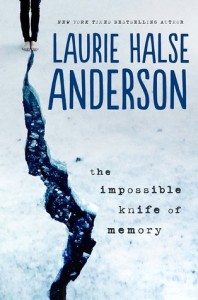On September 10, individuals and organizations around the world observed World Suicide Prevention Day with local activities and a social media campaign. I was invited to contribute photos in conjunction with a Lego activity on the theme of Connectedness, sponsored by the Centre for Suicide Prevention in Calgary, Alberta.
 At the time that I was contacted to help with the campaign, I was nearing the end of The Impossible Knife of Memory. In Laurie Halse Anderson’s most recent novel, high school senior Hayley Kincain is an only child who lives with her single father, a veteran of the wars in Afghanistan and Iraq. For the past few years, her father has worked as a truck driver, and she has traveled with him in the cab of their 18-wheeler. Now he has decided to settle down in the upstate New York town where he grew up and where Hayley lived until her grandmother died, while her father was serving as a Captain in the U.S. Army.
At the time that I was contacted to help with the campaign, I was nearing the end of The Impossible Knife of Memory. In Laurie Halse Anderson’s most recent novel, high school senior Hayley Kincain is an only child who lives with her single father, a veteran of the wars in Afghanistan and Iraq. For the past few years, her father has worked as a truck driver, and she has traveled with him in the cab of their 18-wheeler. Now he has decided to settle down in the upstate New York town where he grew up and where Hayley lived until her grandmother died, while her father was serving as a Captain in the U.S. Army.
In a traditional school for the first time in years, Hayley is having trouble adjusting to the rules. So is her father, who is haunted by flashbacks and nightmares of IED attacks, killing innocent civilians, and the bodies of “brothers” and “sisters” who never made it home alive. While classmates tackle homework assignments and extracurricular activities, Hayley fetches her father from bar fights and stands between him and people from his past who seem to bring out the worst in him.
Anderson’s novel highlights the challenges that veterans of those wars face along with their families. Hayley’s closeness to her father means that she has absorbed the hyper-alertness, paranoia, and emotional numbness and detachment characteristic of PTSD. She lives in fear that her father will kill himself, a fear that turns out to be well founded. The conflict comes because Hayley needs to get on with her life, but she is the only person who connects her damaged father to the real world, and even she is starting to crack.
As our national leaders talk again about going to war in the Middle East, we need to think about the impact of these wars on the people who fight them, and on their families. The rate of suicides among veterans of the wars in Afghanistan in Iraq is more than twice the national average. Veterans who seek help (and far too many don’t) face long waits for treatment that is difficult and costly.
Anderson’s portrait of Hayley’s father, Captain Andy Kincain, shows the costs of war. In the course of the novel, we get glimpses of the person he could have been—someone who showed intelligence, courage, and leadership in difficult circumstances. Yet because of the war, he is now someone who cannot hold down a job, spends his meager disability payments on drugs and alcohol, and is in danger of becoming homeless.
While The Impossible Knife of Memory is a work of fiction, it is based on the experiences of real people. This is the human cost of war—hidden but truly devastating for our warriors and those close to them.
3 comments for “How PTSD Crosses Generations: The Impossible Knife of Memory”